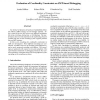Free Online Productivity Tools
i2Speak
i2Symbol
i2OCR
iTex2Img
iWeb2Print
iWeb2Shot
i2Type
iPdf2Split
iPdf2Merge
i2Bopomofo
i2Arabic
i2Style
i2Image
i2PDF
iLatex2Rtf
Sci2ools
118
click to vote
ISMVL
2009
IEEE
2009
IEEE
Evaluation of Cardinality Constraints on SMT-Based Debugging
For formal verification of hardware Satisfiability Modulo Theory (SMT) solvers are increasingly applied. Today’s state-of-the-art SMT solvers use different techniques like term-rewriting, abstraction, or bit-blasting. The performance does not only depend on the underlying decision problem but also on the encoding of the original problem into an SMT instance. In this work, encodings for cardinality constraints in SMT are investigated. Three different encodings are considered: an adder network, an encoding with multiplexors, and a newly proposed encoding with shifters. The encodings are analyzed with respect to size and complexity. The experimental evaluation on debugging instances that contain cardinality constraints shows the strong influence of the encoding on the resulting run-times.
Artificial Intelligence | Cardinality Constraints | ISMVL 2009 | SMT Instance | State-of-the-art Smt Solvers |
| Added | 24 May 2010 |
| Updated | 24 May 2010 |
| Type | Conference |
| Year | 2009 |
| Where | ISMVL |
| Authors | André Sülflow, Robert Wille, Görschwin Fey, Rolf Drechsler |
Comments (0)

